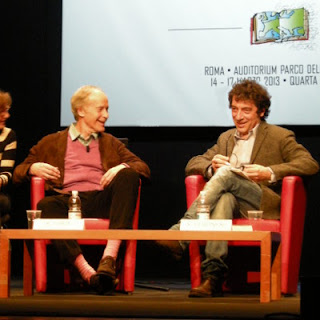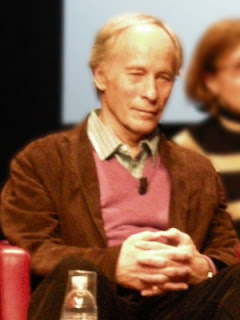 |
| Richard Ford and Sandro Veronesi at Libri Come |
Richard Ford cuts a physically impressive figure – he's surprisingly tall, with silver hair, sparkling, very pale blue eyes, and a warm, mischievous smile. His softly spoken, thoughtful answers, and modest replies during the conversation that followed, made him an irresistibly likeable person. He was utterly charming as he gently demolished Veronesi's opening comments on the presumed stoicism of Frank Bascombe, the protagonist of his famous trilogy The Sportswriter, Independence Day, and The Lay of the Land, reaffirming instead, the sense of optimism in his writing.
You know, I would hate to think that I was stoico! I would hate to think that I was a kind of tough, clenched jaw, sit tight kind of person... For me to practise that attitude of trying make something whole that has been damaged is to me supremely optimistic. Maybe that's the difference between the European point of view and the American point of view...I don't know...maybe I'm just a victim of stupid American optimism!...I might be, I might be...But if I am, I'm doomed to have it! I think that to try to regenerate your life, and to try to carry on, and that you have so much life left, is potentially even, if you'll excuse my saying so, joyous. […] I'm more of a Bacchanalian personality, so stoicism is almost alien to me! Surely in Rome people can understand the possibility for Bacchanalian personality...Rome invented Bacchanalia!
 |
| Richard Ford in Rome |
[…] the whole business of writing novels is fundamentally optimistic because it imagines that there will be someone to read this book, it imagines that there will a future in which this book can have a life that will outlive me […]The insistent Veronesi, however, refined his definition of Bascombe's stoicism as “patient endurance” and integrity, to which Ford, with a chuckle, agreed. This, in fact, seemed to really resonate with him, and after quoting a line from William Faulkner's 1951 Nobel speech about man's endurance, he talked about the important of patience in his own life and writing.
The whole notion of patience is very dear to my heart. I'm a very slow thinking, slow acting person, so patience has been a big part of my life from the beginning, so much so that I think there's an old maxim which says that impatience is a form of laziness...so to be patient means to get the most done. It's certainly a feature in one's life which is necessary to write novels, if only because to write novels the real requirement is to stay in the book, not to finish the book...anybody can finish a book! But it takes real patience and real endurance and real interest to stay inside the book for as long as you can because it's only then that you can understand it better and make it better.There was much anxious fidgeting from those around me, particularly Italian readers who have not yet had the chance to read Ford's latest novel Canada, released only this week in Italian translation, when Veronesi veered dangerously close to the spoiler-zone on several occasions, when talking about the new book. Thankfully, most of the discussion focussed on the recurrent theme in Ford's novels of crossing borders – both symbolically and geographically - and successfully avoided revealing too many plot details.
For Ford the sense of crossing borders begins on the page itself:
For me who was always writing sentences and paragraphs, one of the things I observed as a reader and as a writer was that when I came to the end of a paragraph and I started a new paragraph, something happened; there was some sense of torque, some sense of power that was achieved in getting across the white space from one utterance to another utterance.He spoke about the creative process of discovering the theme of a book, and how the theme of crossing borders, with the sense of freedom it brings, had come naturally to Mississippi-born Ford, who left the south as soon as he could.
We've all had this experience. You can read something and it just resonates with you. It may be something seemingly insignificant, when you read it... it just has a little tingle about it, and those are the kind of things that cause writers to write novels, or the poetry writers to write poems, or essays, it's a kind of a commotion you feel on some level of sublimated emotion, a sense of emotion, a sense of commotion, and that's what we try to put in play in books. And sometimes these things become themes, like crossing borders […] I grew up in Mississippi, which is a very bad place to grow up in lots of ways, and I couldn't wait to leave, I couldn't wait till I was eighteen years old and could get on the train and cross the border from Mississippi, to go from the south, to go to the north, and so for me I come by this preoccupation quite rightly because for me crossing borders always meant some kind of freedom.Ford's spoken language is as engaging and utterly absorbing as his exquisitely written prose - I could have listened to Richard Ford speak all day long! Sadly the discussion was over far too soon. One of the fun aspects of the Rome book fest, however, are the many free events, readings and interviews happening all over the Parco della Musica. On leaving the event I was lucky enough to stumble upon the recording of a Rai 3 radio interview with Richard Ford for the show Fahrenheit, which was taking place in the foyer, and where he was joined by another stellar literary name – none other than Salman Rushdie! Rushdie was in Rome to promote the Italian publication of his memoir about living undercover during the fatwa years - Joseph Anton.
Watch a very brief clip of the conversation between Richard Ford and Salman Rushdie below or click here to watch on YouTube.
To complete a perfect afternoon, I was thrilled to then get the chance to meet Richard Ford later in person and chat for a few moments at a book signing session in the Auditorium book shop.
Comments